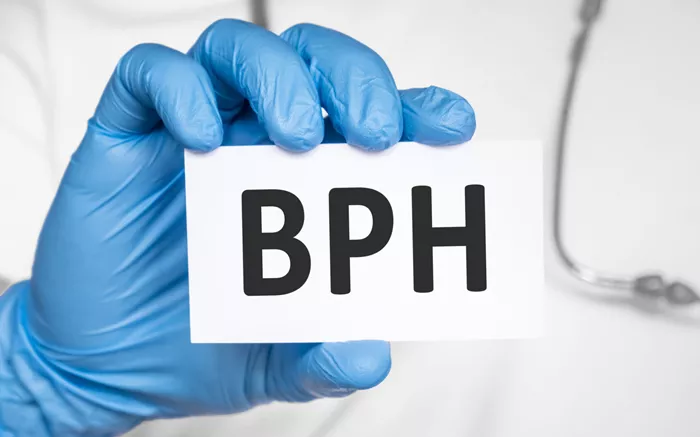Benign Prostatic Hyperplasia (BPH) is a common condition that affects many men as they age. It involves the enlargement of the prostate gland, which can lead to uncomfortable symptoms like frequent urination, especially at night, a weak urine stream, and difficulty fully emptying the bladder. While BPH is not cancerous, it can affect a man’s quality of life, making it crucial to find ways to manage the symptoms.
Over-the-counter (OTC) medications can be a good option for those looking for relief without a prescription. In this article, we’ll discuss the 6 best OTC medicines for BPH, providing you with effective and accessible treatment options.
1. Saw Palmetto
Saw palmetto is one of the most popular herbal supplements used to treat symptoms of BPH. This natural remedy is derived from the fruit of the saw palmetto plant and is believed to work by reducing the size of the prostate and improving urine flow. It has been used for centuries and is often recommended as a first-line treatment for mild to moderate BPH symptoms.
Why It’s Effective:
- Reduces prostate size: Saw palmetto helps shrink the prostate, which can ease symptoms such as frequent urination.
- Improves urinary flow: Many men find relief in their ability to urinate more freely after using saw palmetto.
- Natural remedy: It is a non-invasive, herbal option that avoids side effects commonly associated with pharmaceutical treatments.
Best For: Men who prefer a natural, herbal approach and are dealing with mild to moderate BPH symptoms.
2. Beta-Sitosterol
Beta-sitosterol is a plant-derived substance found in many fruits, vegetables, and nuts. It is known to improve urinary symptoms related to BPH, such as a weak stream, urgency, and incomplete bladder emptying. Studies suggest that beta-sitosterol can help reduce inflammation in the prostate and improve overall urinary function.
Why It’s Effective:
- Promotes better urinary flow: Beta-sitosterol has been shown to help men with BPH by improving urinary flow and reducing frequency.
- Reduces symptoms: It can relieve symptoms like urgency, nighttime urination, and difficulty starting the urine stream.
- Fewer side effects: Compared to prescription medications, beta-sitosterol has fewer side effects and is generally well tolerated.
Best For: Men who want a plant-based supplement to improve urinary function without significant side effects.
3. Pygeum
Pygeum is an extract from the bark of the African plum tree, and it has been traditionally used in African medicine to treat urinary and prostate issues. Research suggests that pygeum can help reduce inflammation in the prostate and relieve urinary symptoms associated with BPH.
Why It’s Effective:
- Reduces prostate inflammation: Pygeum works by decreasing swelling and inflammation in the prostate, leading to better urinary flow.
- Relieves symptoms: It helps reduce nighttime urination and urgency, improving overall quality of life.
- Supports prostate health: Regular use of pygeum may contribute to overall prostate health and well-being.
Best For: Men who are looking for a natural supplement that targets prostate inflammation and urinary issues.
4. Pumpkin Seed Oil
Pumpkin seed oil is another natural supplement that is believed to have benefits for BPH. It is rich in antioxidants and essential fatty acids, which can help reduce inflammation and support overall prostate health. Some studies have shown that pumpkin seed oil may also help shrink the prostate and improve urinary symptoms.
Why It’s Effective:
- Anti-inflammatory properties: Pumpkin seed oil helps reduce inflammation in the prostate, which can alleviate urinary symptoms.
- Supports prostate health: It provides essential nutrients that may help maintain prostate health over time.
- Promotes better urination: Many men report improvements in urinary flow and less frequent nighttime urination after using pumpkin seed oil.
Best For: Men who prefer a natural supplement that may support long-term prostate health and reduce urinary discomfort.
5. Nettle Root
Nettle root has been used in traditional medicine for centuries to treat various urinary and prostate issues. This plant extract is believed to have beneficial effects on BPH symptoms, helping to reduce prostate size and improve urinary flow. Nettle root can also be combined with other herbs for enhanced results.
Why It’s Effective:
- Reduces prostate enlargement: Nettle root can help shrink the prostate and relieve pressure on the bladder.
- Improves urinary function: It is particularly effective for improving urine flow and reducing nighttime urination.
- Anti-inflammatory effects: Nettle root has natural anti-inflammatory properties, which can help reduce swelling in the prostate.
Best For: Men dealing with moderate BPH symptoms and looking for a natural, herbal remedy.
6. Zinc
Zinc is an essential mineral that plays a critical role in prostate health. Some studies suggest that zinc deficiency may contribute to the development and worsening of BPH. Supplementing with zinc can help reduce the risk of prostate enlargement and improve urinary symptoms.
Why It’s Effective:
- Supports prostate health: Zinc is vital for maintaining the health of the prostate gland and may prevent excessive enlargement.
- Improves urinary flow: Zinc supplementation has been shown to improve symptoms such as difficulty urinating and nighttime urination.
- Reduces inflammation: Zinc has anti-inflammatory properties that can help decrease swelling in the prostate.
Best For: Men who have low zinc levels or want to prevent further prostate enlargement.
Conclusion
While BPH can be a challenging condition to manage, there are several effective over-the-counter remedies available. From natural supplements like saw palmetto and pygeum to essential nutrients like zinc, these treatments can help alleviate symptoms, reduce inflammation, and support prostate health.
It is essential to remember that while OTC medications can provide relief, they may not work for everyone. If your symptoms persist or worsen, it’s important to consult with a healthcare provider to explore other treatment options. Supplements should be considered as part of a broader approach to managing BPH, which may include lifestyle changes, regular exercise, and a healthy diet.
Related articles:
- BPH Symptoms? 4 Solutions To Relieve Discomfort Fast
- The 7 Best Treatment Options For BPH
- Basic Understanding: Natural Best BPH Supplements For Men


